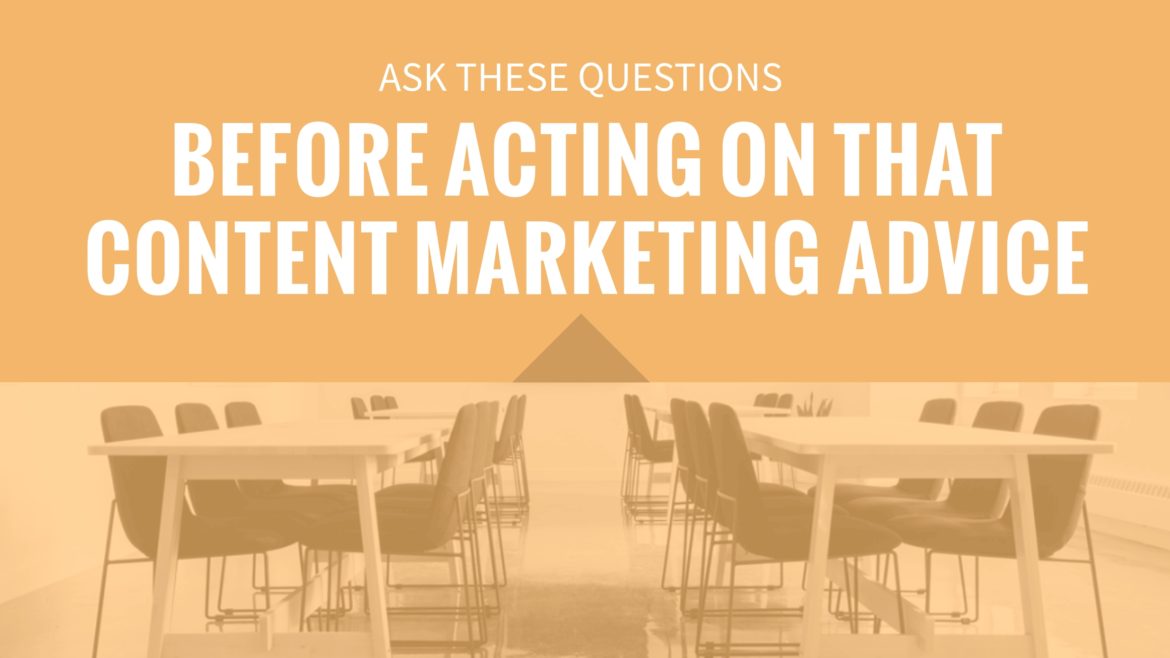Everywhere you turn, there’s another content marketing expert (or “expert”) spouting off advice to an audience. As with anything you read online, there’s good advice, and there’s an equal amount of bunk advice. There’s also a lot of content that seems like advice, but when you strip away the extraneous words, you find that it’s just a lot of hot air.
Sometimes, it is overwhelming to sort through all the advice that is out there. Here are some questions to help you evaluate the advice you come across and determine what is helpful to your own business – and what is fluff.
Is This Applicable?
Not all advice applies to all businesses. For example, service-based businesses will have different content needs than will product-based businesses. It’s okay to skip out on reading advice for cog manufacturers if you’re selling iPhone and Android apps. Information about setting up the perfect cog photograph will be irrelevant to your needs.
Not only should you skip out on advice that is for creating content for another type of business, you should also skip out on advice that is meant for those looking at other target markets. If you’re marketing to Millennials, for example, then that article on creating viral content for Boomers is not likely to be helpful to you.
Finally, don’t waste time with advice for platforms you don’t use. If you will never be a Blogspot user, there is absolutely no reason why that 9 Tips for Creating the Perfect Blogspot Profile article is going to help you. It really is okay to skip over advice that is not targeted toward your needs.
Is This From A Reputable Source?
The Internet is full of pop-up blogs and web experts. What experience does the writer have with content marketing? What website is the advice generated from? Entrepreneur Magazine or Harvard Business Review, for example, are reputable sources.
You’ll also find that content marketing agencies in your company’s niche will generally provide advice that is useful to your business. Jane Blogger, with no previous content agency experience and who has just purchased her domain name and started her first blog, is probably not the best person to follow for advice.
Other sites need to be weighed carefully. One sign that the advice may not be from the most reputable source is poor grammar and spelling.
Another sign that you might not have the best source for information is if the article has grandiose claims of immediate success. We’ve all seen those Twitter accounts that promise you 100,000 followers in three days if only you buy their service.
The best sources for content marketing advice will be those who have been writing content for the web for a good while – even if they have relatively new businesses. One way to check for this is to read the website or blog’s “About Us” page. Here are some other clues that the advice might not be coming from the best source:
Is This Novel And Specific?
The Internet is also full of copycats and those producing content just to produce a lot of content. It’s an unfortunate truth that many articles you will find on content marketing will be regurgitating other articles. Even worse, many articles will be so vague as to be applicable to any situation, kind of like your local newspaper’s horoscope column.
If you’re reading an article on content marketing, and you think to yourself “well, duh” or it feels like it’s something you’ve read before, it likely is. It’s also likely that the writer either doesn’t know what he or she is saying and is taking it from another site’s advice or that the writer is glossing over the fact that he or she doesn’t actually know what he or she is talking about.
Either way, it’s best to continue on and spend your time on other, more detailed and nuanced, reading.
Does This Sound Like A Skipping CD?
Do you feel like you’ve read the same five words over and over again? The article you’re looking at may be suffering from keyword stuffing. Good content writers avoid it, and those who are writing about how to best market your business online will most definitely avoid it – if they are reputable writers.
When you’re reading an article, and it feels like someone has used the phrase six or seven times, and the phrase is jarring and does not jive with the rest of what has been written, it’s time to move on. The person is probably just trying to get page views, and while Google’s algorithms have come a long way in combating keyword stuffing, you’ll still find such articles in results and shared on social media platforms.
What Is The Motive?
If I had a nickel for every time I’ve read an article that ends with “to learn more specific things about how to market your services to a global audience, purchase our services (or our e-book, or this webinar, etc.),” I would probably be able to purchase some lunar real estate.
Many articles ending with the sales pitch fall into the generic and what you’ve read before category, but sometimes, I’ll stumble across one that sounds pretty legit and specific – and some of the articles ending this way do have valuable advice – only to find the same advice somewhere else or to learn that the advice in the article is only partially true.
Asking what the motive for the article is can definitely be helpful in determining whether advice should be taken or not.
Is The Advice Actionable? If So, What Action Will You Take?
Finally, you should determine whether there is any action that you can take as a result of reading the article. Is the action feasible for your company? Is it applicable? What steps will you need to take to make it happen?
If you’ve found that indeed the content marketing advice is applicable to you, that it’s from a reputable source, and that it’s actionable, then it’s time to go ahead and make a plan for acting on it within your own business.
Ronda Bowen is VP of Editorial Services at Creative Mindscape. She also provides editorial consulting services to a variety of businesses and individuals, runs a handful of blogs (including WiningWife®), and serves as Fundraising Director for JB Dondolo, Inc. In her downtime, she’s a distance runner, a foodie, a wine and coffee aficionado, seamstress and crafter, and board game enthusiast. Learn more about Ronda’s various projects on her website.




